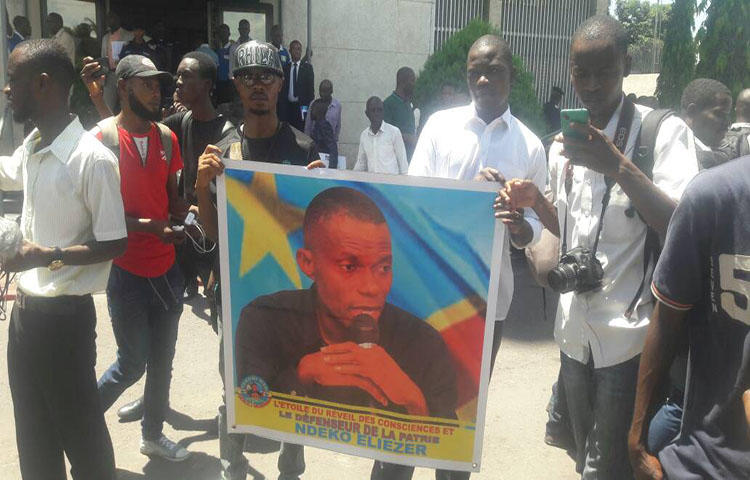New York, April 4, 2018–Authorities in the Democratic Republic of Congo should immediately release Eliezer Ntambwe, a journalist and presenter at the privately owned news outlet and YouTube channel Tokomi Wapi, the Committee to Protect Journalists said today.
Congolese judicial police on the morning of April 2 arrested Ntambwe at Tokomi Wapi‘s Kinshasa office and took him to the prosecutor general’s office in Gombe, a district in the city’s northwest, where he is still being held, according to the journalist’s lawyer, Hervé Diakiese, and the Observatory for Press Freedom in Africa, (OLPA), a local press freedom organization. Ntambwe has not been charged, Diakiese said.
Ntambwe was detained after the governor of DRC’s central Kasai Oriental province, Ngoyi Kasanji, accused him of defamation and extortion relating to an interview the journalist conducted, according to Diakiese and OLPA.
“No journalist should be deprived of his liberty simply on accusations by a powerful political figure, and before the facts of the case have been made clear,” said CPJ Africa Program Coordinator Angela Quintal. “Eliezer Ntambwe should be freed while due process of the law is carried out.”
Kasanji told CPJ that Ntambwe’s detention was fair because the prosecutor general was still investigating accusations he made against the journalist.
Diakiese said the investigation could be carried out without arresting the journalist. The lawyer told CPJ that he had submitted a legal request for Ntambwe’s release.
Diakiese also said Congolese criminal procedure grants the prosecutor general up to five days from Ntambwe’s arrest to investigate the claims. After five days, the prosecutor may ask a judge to keep Ntambwe in preventive detention for an additional 15 days, Diakiese told CPJ.
The governor told CPJ that Ntambwe sought to extort him and threatened to release a March 8 interview Ntambwe conducted with two guests for Tokomi Wapi during which the governor was accused of involvement in violently seizing a diamond from a miner.
“He [Ntambwe] asked for money [to not broadcast the interview],” Kasanji told CPJ and said he refused to pay.
Diakiese and two other Congolese journalists with whom CPJ spoke who did not want to be named for fear of reprisal said they believe Ntambwe’s arrest was meant to intimidate the press.
Following Ntambwe’s arrest, Congolese journalists gathered outside the public prosecutor’s offices calling for their colleague’s freedom. Over the last year, journalists in the DRC have been repeatedly detained and harassed, according to CPJ research.
